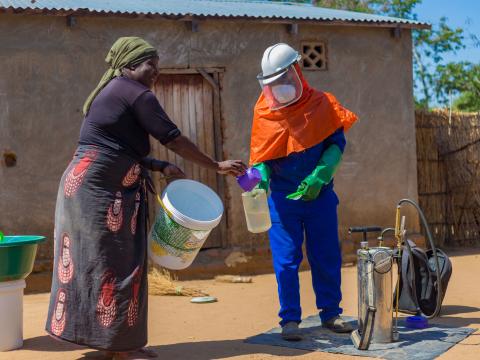Indoor spraying brings relief to malaria-stricken district

Malawi is one of the countries in sub-Saharan Africa that have been grappling with a higher malaria prevalence rate lately.
Mangochi , a lake shore district in the southern part has had a higher incident rate which put unprecedented pressure on the health workforce in the district.
65-year-old Margaret in the district frequented health facilities with her grandchildren seeking malaria treatment.
As such, the 65-year-old granny spent more time in hospital corridors trying to get her grandchildren off the malaria burden, she could concentrate less on her farming endeavours.
“Our community faced rampant malaria incidents in the past. As such, for me, I often visited health facilities seeking medication for my grandchildren, I could not do much work on my farm to produce food, and this affected my household’s productivity on the farm,” says Margaret.

However, with the Global Fund-supported Indoor Residue Spray (IRS) Mangochi has reduced malaria incidences considerably.
With IRS, housing structures are fumigated with insecticides that kill malaria-causing anopheles mosquitoes.
Margaret has had her compound structures fumigated for the third time, three years in a row. She is happy, since the start of the IRS exercise, she no longer has had any malaria incidence in her family.
“When IRS came, most people were reluctant, but when I heard that the exercise was aimed at killing malaria-causing mosquitoes, I had my house sprayed because I did not want my grandchildren to suffer from malaria again.”

“Because I no longer grapple with malaria, I am now able to work on my farm efficiently and produce enough food and some cash crops to support my family, so I am so grateful to World Vision and Global Fund for this gesture.,” she adds.
Elias, a Health Surveillance Assistant (HAS) in the area says IRS has reduced malaria incidences by over 70 percent in the area.
“As an HSA, I conduct village clinics. And previously I could record over 7 malaria cases against 10 tests conducted, but after IRS, we have an average of one case of 10 tests done. So IRS has been so crucial in Malaria prevention in this community,” says Elias.
Lamusi Abdul, Mangochi District Malaria Coordinator praises the IRS exercise for covering over 90 percent of the district’s population with the household fumigation exercise.
Abdul says IRS has reduced the malaria incident rate in the district by 50 percent now.
“Previously before IRS, malaria incident rate was at 359 cases per 1000 population in 2019, but after IRS, the rate is at 145 cases per 1000 population, at least a 50 percent improvement. We are grateful to World Vision and the Global Fund for this life-saving project,” says Lamusi.